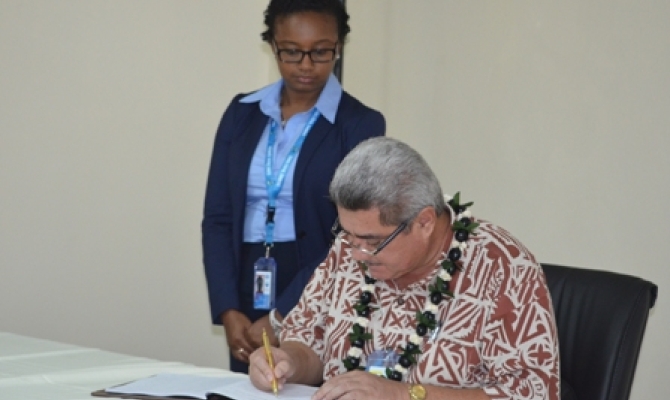
Climate Change Resilience
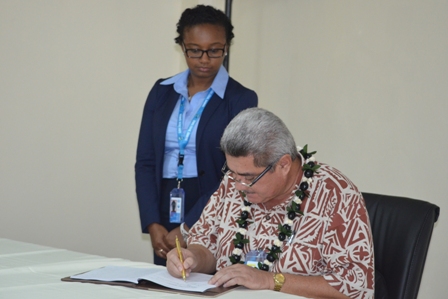 Deputy Prime Minister of Samoa, Hon. Fonotoe Nuafesili Pierre Lauofo
Deputy Prime Minister of Samoa, Hon. Fonotoe Nuafesili Pierre Lauofo4 September 2014, Apia, Samoa - Over 150 delegates and members of the international development community from more than 45 countries were stunned to see leader after leader approach the podium to sign a historic sustainable energy and climate resilient treaty that will significantly change the lives and destiny of over 20 million small islanders, for the better.
Lead by the Deputy Prime Minister of Samoa, Hon. Fonotoe Nuafesili Pierre Lauofo, multiple leaders from the Pacific, Caribbean and African, Indian Ocean and Mediterranean Sea (AIMS) regions, forcefully raised their voices in unison and accepted responsibility for fulfilling the commitment to the Small Island Developing States (SIDS) Sustainable Energy mechanism – SIDS DOCK.
The opening for signature of this historic SIDS DOCK Treaty – a SIDS-SIDS Initiative - was a major highlight of the first day of the United Nations (UN) Third International Conference on SIDS, taking place in Apia, Samoa, from 1-4 September.
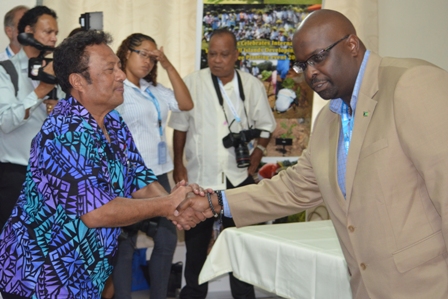
The unprecedented and unexpected number of Heads of State and Government present, sent a strong signal to the standing room only audience, the SIDS population and the international community, demonstrating how deeply committed SIDS leaders are and that they all firmly believe that SIDS must, have and will take responsibility for charting the future of their countries towards a path that would see a total transformation of the SIDS economy away from fossil fuels, to that of one driven by low carbon technologies.
The event was considered so important to the Republic of Cabo Verde, that the Prime Minister, Hon. José Maria Neves, excused himself and his entire delegation from the Plenary Hall, to ensure that Cabo Verde, a SIDS DOCK Founding Member was well-represented at the signing – the Cabo Verde Government has one of the most ambitious plans in SIDS, that aims to achieve 100 penetration of renewable energies in Cabo Verde, by 2020.
More than half the members of the Alliance of Small Island States (AOSIS) were present for the signing of the historic treaty, witnessed by the SIDS DOCK partners Denmark, Japan and Austria, whose kind and generous support facilitated SIDS DOCK start-up activities; also present were SIDS DOCK partners, the United Nations Development Programme (UNDP), the World Bank, the United Nations Industrial Development Organization (UNIDO) and the Clinton Foundation.
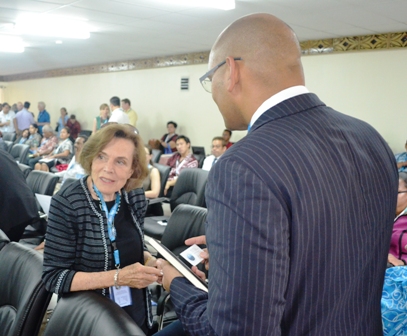
The treaty was signed by the governments of Barbados, Belize, Bahamas (Commonwealth of the), Dominica (Commonwealth of), Cabo Verde (Republic of), Cook Islands, Dominican Republic, Fiji (Republic of), Grenada, Guinea Bissau, Kiribati (Republic of), Niue, Palau (Republic of), Saint Kitts and Nevis, Saint Vincent and the Grenadines, Samoa (Independent State of), Seychelles (Republic of), and Tuvalu.
The Statute will remain open for signature in Apia, Samoa until September 5, and will re-open for signature in Belmopan, Belize, from September 6, 2014 until it enters into force. Belize is the host country for SIDS DOCK, with Samoa designated as the location for the Pacific regional office.
The special signing event took place on Monday, 1 September at the UNSIDS Conference Venue.
Further information on SIDS DOCK participation at Samoa is available at: http://sidsdockforum2014.org/
SIDS unashamedly taking the lead on sustainable energy
4 September, 2014, Apia, Samoa - Sustainable Energy partnerships for small island developing states were the topic of conversation at a special side event hosted by Secretariat of the Pacific Regional Environment Programme (SPREP), SIDS DOCK and the Caribbean Community Climate Change Centre (5C) on the third day of the United Nations Conference on Small Island Developing State (SIDS) in Apia, Samoa.
Featured at the event were case studies of best practice sustainable energy partnerships for small island developing states in St Vincent and the Grenadines, Cape Verde and Samoa that demonstrate a sustainable energy partnership for SIDS on an inter-regional basis using the SIDS DOCK Initiative as the framework.
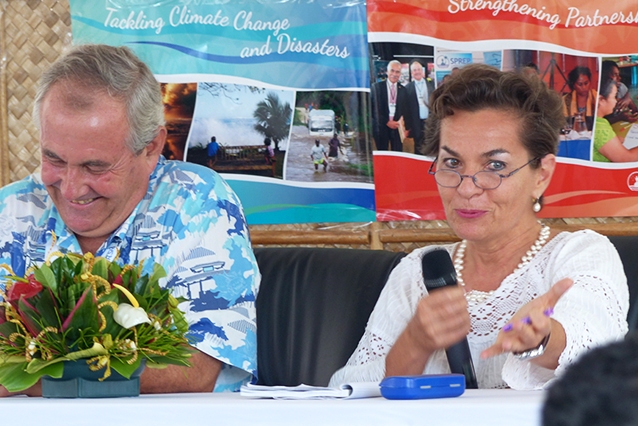 L - R Mr. David Sheppard SPREP, Ms. Christiana Figueres UNFCCC
L - R Mr. David Sheppard SPREP, Ms. Christiana Figueres UNFCCC"That's simply a fact," Ms Figueres explained. "SIDS should use the urgency around climate instability to take the lead, unashamedly, on adopting renewable energy technologies and importantly you need to do it together."
"Science tells us that if we are to stabilise this climate we need to move towards an economy that is not carbon-dependent. The great news is that this is completely do-able for small island states. I urge SIDS to get the moral authority to challenge the world on this fact."
While much of the dialogue on sustainable energy is on greenhouse gas emission reduction, Mr Martin Krause from the United Nations Development Programme (UNDP) emphasised the important role that renewable energy technology has on poverty alleviation.
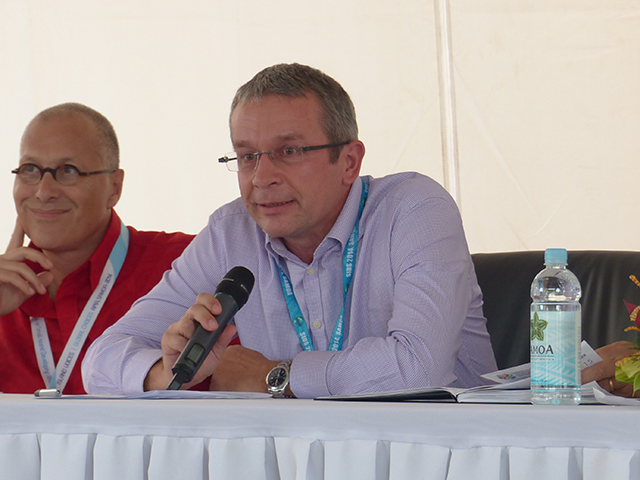
Stressing that we need to not leave renewable energy to the engineers, Mr Krause, gave examples of the ways in which the roll out of solar power mini grids in remote areas have provided communities with access to electricity for the first time. Such initiatives have a huge influence on the economic and human health of households that have previously had to rely on kerosene.
Officiating the event, SPREPs Director General Mr David Sheppard, spoke about the long history that SPREP has with SIDS DOCK.
"SPREP was an active founding member of the team that developed the SIDS DOCK concept from 2009 onwards. This was driven by our focus on climate change implementation in the region, and the need for renewable energy to be a major part of the region’s mitigation response."
The three key issues highlighted by this event were that these success stories were based on partnerships that recognised the specific challenges of SIDS. They also showed how important political will and leadership from the recipient country was a determinant for success. Furthermore they showed how a small investment could create major benefits for the SIDS.
Also speaking at the event were Professor Albert Binger (SIDS DOCK), Hon. Clayton Burgin (Minister from St Vincent and the Grenadines) Mr Sione Foliaki (Samoa Ministry of Finance), Mr Antonio Baptista (Director General for Energy, Cape Verde), Mr Renato Mele (European Union), Mr Atul Ratiri (University of the South Pacific), Mr Jeffrey Skeer (GREIN) and Mr Pradeep Monga (UNIDO).
The new SIDS Dock organisation hailed a historical event for South-South co-operation
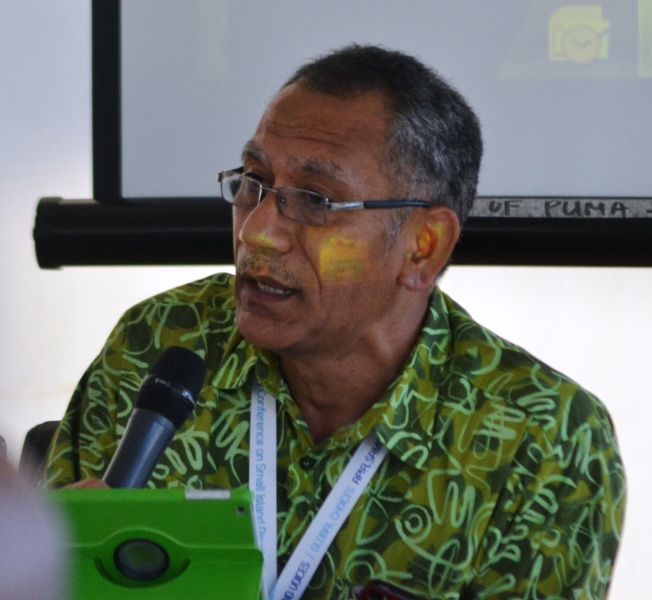
Mr. Solomone Fifita, SPC
Ms. Makereta Komai, Editor, PACNEWS
4 September 2014, Apia, Samoa - The establishment of SIDS DOCK as an international organisation to assist Small Island Developing States (SIDS) access international financing, technical expertise and technology has been described as an ‘historical event.’
It’s a demonstration of South-South co-operation and establishes for the first time an international organisation that will work exclusively for SIDS.
“It is based on the premise that if SIDS are spending millions of dollars to import fossil fuels and if they can transform their energy sector by using renewable and energy efficient technologies, then there will be savings for climate change adaptation activities," said Solomone Fifita, the Deputy Director of Energy for the Secretariat of the Pacific Community (SPC).
Fifita said there are plans to set up centres of excellence for renewable energy in the Caribbean, Africa and the Pacific.
“It’s a South-South collaboration that will feature an exchange of expertise, knowledge and best practices."
Solomone said the new SIDS Dock will raise funds to address the transformation of SIDS energy sector to be less reliant on fossil fuel.
He said donors and development partners have pledged support for the work of SIDS Dock.
“Denmark has already pledged US$13 million and the Government of Japan has set aside US$15 million. Unfortunately these funds have been held up by the World Bank and the United Nations Development Programme (UNDP)."
“Now that the SIDS Dock is now established under the Treaty signed here in Apia, it will provide a platform for donors to channel financing and other technical expertise for SIDS."
More than 15 countries have signed the Treaty for the new organisation that will be headquartered in Belize in the Caribbean.
The SIDS DOCK - UNIDO partnership and donor trust fund event took place on Tuesday 2 September at the UNSIDS Venue.